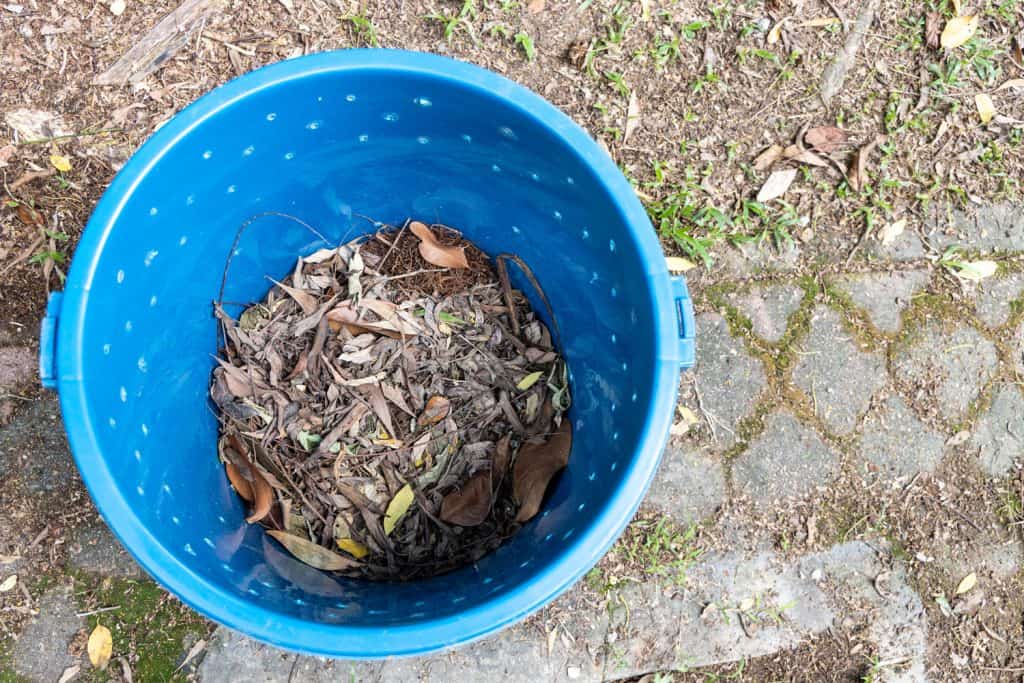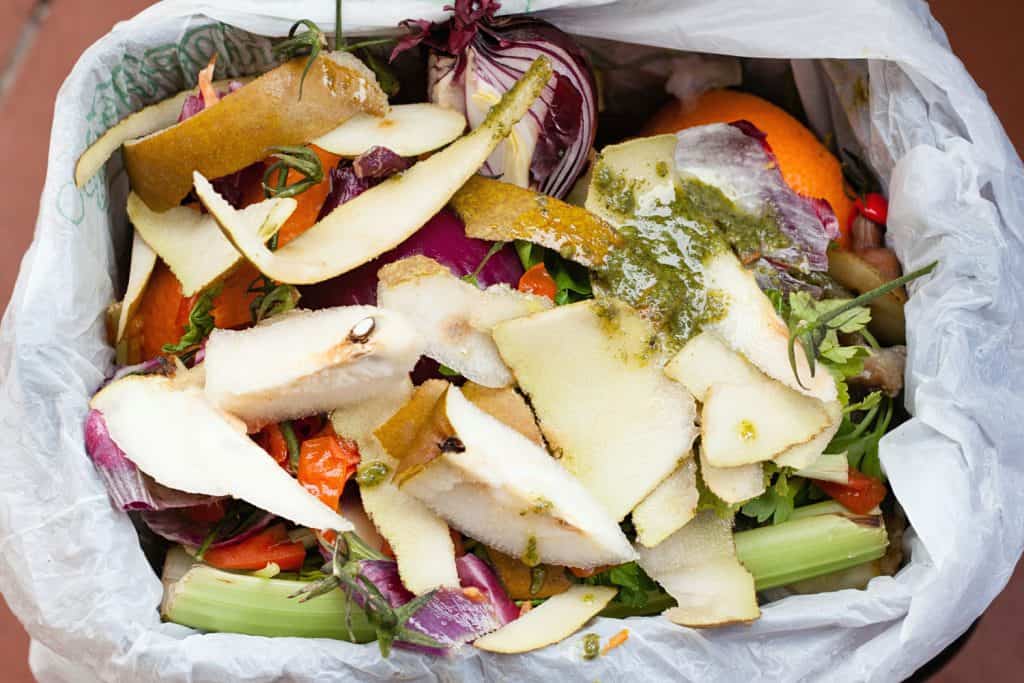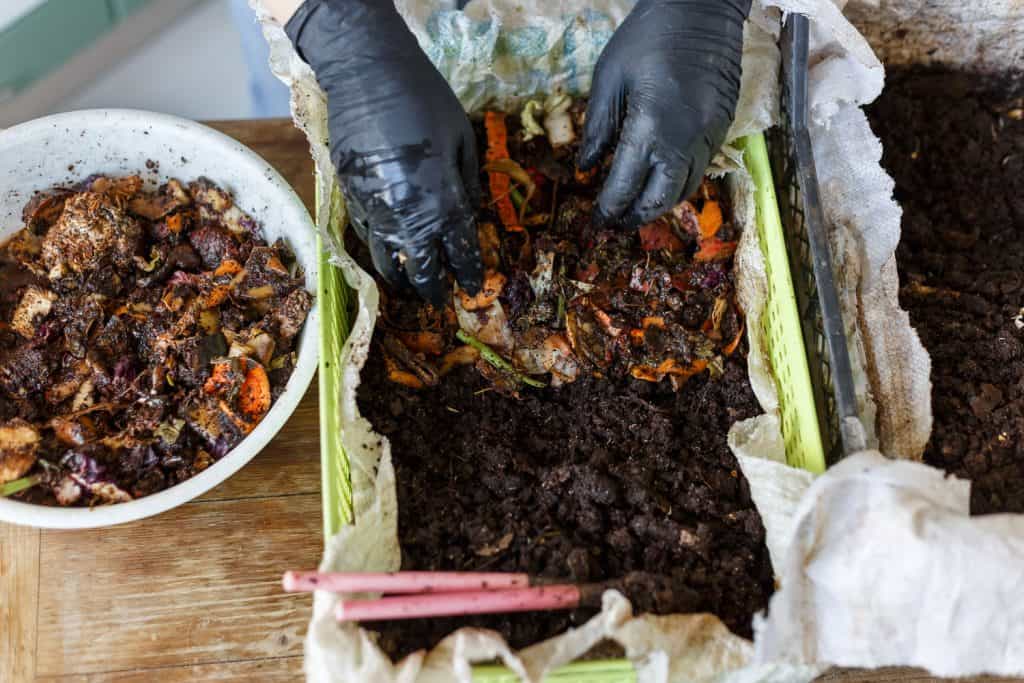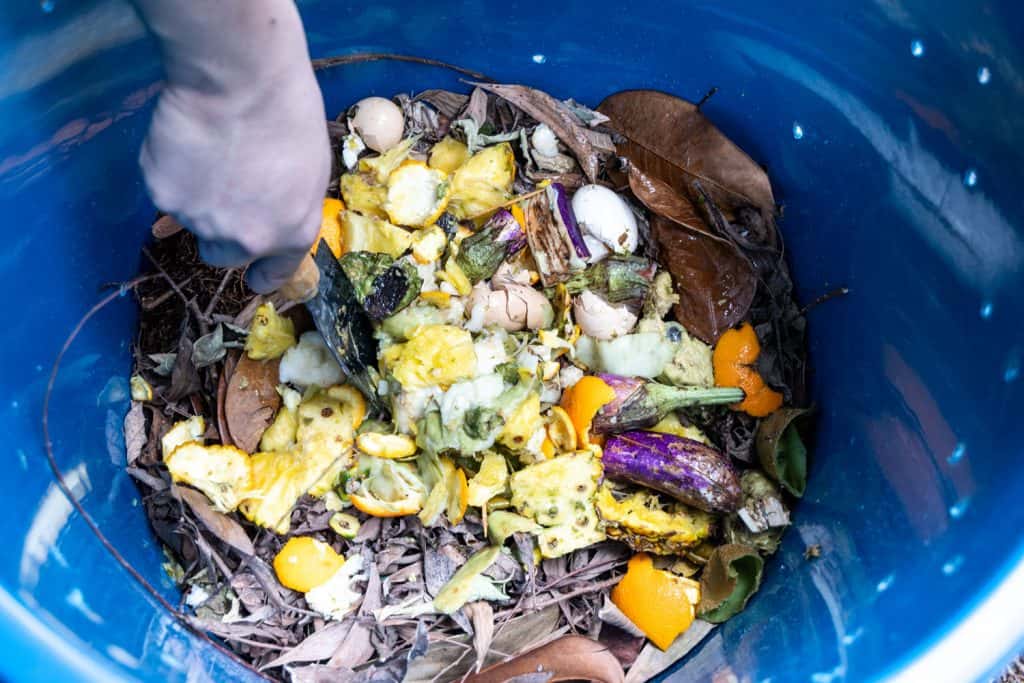Composting is a wonderful way to reduce landfill waste and naturally fertilize your houseplants or home garden. Are you interested in composting? Reside in the great state of Florida? Worried about the sandy soil Florida tends to have? If the answer to any of those questions is yes, then continue reading cause we've researched all about composting in Florida!
For a basic composting pile you will want to follow these simple steps. You can either start your compost on the ground in a pile, invest in a composting bin, or make your own container.
- Combine green and brown materials. You will want a ratio of three parts brown materials to one part green.
- Moisten your pile.
- Stir compost occasionally.
- Let it "cook." The compost will be ready when the soil is dark and no scraps remain in the mix.
The steps listed above are just the basics of what to do with your compost pile. For an in-depth guide to all things composting continue reading below!
![Shredded vegetable and other elements inside a small compost bin, How To Compost In Florida [A Complete Guide]](https://gardentabs.com/wp-content/uploads/2021/08/How-To-Compost-In-Florida-A-Complete-Guide-683x1024.png)
Florida's Sandy Soil
If your Florida yard suffers from sandy soil like a lot of Florida yards do, there is good news — you can successfully grow the garden of your dreams by composting. The Florida "sugar sand" most gardeners have doesn't do a great job holding onto nutrients and water. Adding compost to your soil will help your plants tremendously by giving them the nutrients they need. It will also help them hold onto water, so they won't need to be watered quite as often.
All About Composting In Florida
First, you will want to decide how and where you will create your compost pile or bin. You can check out our article on Compost Pile Vs Bin – Which Is Right For You? to decide.
Once you have decided whether you should start composting in a pile or a bin, the first step is to combine your green and brown materials. A ratio of three parts brown materials to one part green has been shown to be the best ratio for composting.
Brown Materials

Your brown materials will consist of dried plant matter. Things such as dried-out leaves, branches, cardboard, and newspaper all work wonderfully as brown material for composting.
Green Materials

Green materials are your kitchen scraps. Things like coffee grinds, banana peels, fresh plant debris, and scrap foods all work great as green materials.
Things Not To Compost
You will want to be careful when collecting your materials for the pile to steer clear of a few items.
- Citrus, onion, and garlic peels may harm worms that will be crucial for decomposition
- Glossy papers that are coated with plastic
- Sticky labels from fruits and veggies are not biodegradable
- Pet or human waste can harbor harmful organisms
- Grease can disrupt the moisture content of your pile
- Meat or bones
- Eggs or dairy
Moisture
You will want to water your pile once you have combined your green and brown materials. The pile should be moist at all times; the consistency you are looking for here will be that of a damp sponge. Not sopping wet but moist.
Oxygen
To add oxygen into your pile you will want to stir it once a week. The pile will initially generate heat, thus "cooking" the materials inside and decomposing them. After four to seven days the pile will cool, and turning the pile helps it to "cook" faster while preventing an unpleasant odor. If you do smell an unpleasant odor, make sure to turn your pile and check the moisture; it should have an "earthy" smell to it. The more you turn your pile, the faster it will work for you.
How long does it take to compost in Florida?
With proper moisture content and frequent turning, the compost pile can be done in as little as six weeks. Here are four signs your compost is ready to be used:
- The compost heap has shrunk to 1/2 of its original size
- All the organic material has broken down and is no longer visible
- The pile is no longer generating heat
- The pile has a dark, crumbly appearance
If turning has been forgotten, the pile will still decompose and compost, but it will just take longer than if it's getting frequent stirs/turning. If your compost isn't ready in six weeks, don't worry. It can sometimes take up to 12 months before the pile is fully ready for use depending on the size and conditions.
Here is a great informative Youtube video example of how to successfully compost in Florida.
Florida composting regulations
Per the Florida Admin. Code R. 62-709.305, backyard composting and the resulting compost do not require a permit or registration. This is provided no public nuisance or any condition adversely affecting the environment or public health is created by the said composting.
If you live in an HOA you will want to check your CC&Rs (Covenants, Conditions, and Restrictions) for any regulations pertaining to your neighborhood on composting. Some CC&Rs might say that an open compost bin is not allowed but a closed bin is allowed, so make sure to check those CC&Rs! If you are cleared for a bin you can also check out our helpful article on Where To Buy A Composter [Top 40 Online Stores].
Indoor Composting

If your HOA does not allow composting, you live in an apartment, or just don't have any yard to store a compost bin, indoor composting is an option. You can do an indoor compost with a worm bin which requires a plastic bin, green and brown materials, and worms.
You can also indoor compost with a newer method called Bokashi which is a much more simple process that doesn't require any worms. Bokashi originated in Okinawa, Japan in the 1980s. This method only requires a bin, bran, and green scraps. Here is an informative video on Bokashi.
Check out this worm composting kit on Amazon.
Check out this Bokashi kit on Amazon.
Compost Pick-Up
If you'd rather not mess with composting at all but you'd still like to contribute to less landfill waste, most cities have community composts or even a curbside pick-up. Community composting is simple. To contribute to a community compost you simply collect your kitchen scraps, store them in the freezer, and then drop them off when you're ready! This site has a helpful list of where to drop off scraps to compost in Florida.
How do you make compost in South Florida?
You make compost in South Florida exactly the same as the rest of Florida. You will want to follow all the same steps listed above depending on the type of compost you are going with. If you are in an apartment or have a small yard you may want to go with an indoor option.
If you want to drop off kitchen scraps for composting in Miami, this is a good list of places to drop them off. Miami-Dade solid waste management also holds workshops to encourage and teach home gardeners to compost. Miami-Dade residents that attend a workshop also receive a voucher for a FREE compost bin! The Miami Beach Botanical Garden also frequently holds composting seminars.
How do you compost in Orlando?
Orlando is a fantastic city to compost in! The city of Orlando is aiming to be a "zero waste" community, meaning they are aiming to eliminate sending solid waste to landfills by 2040. If you reside in the city of Orlando, you can even get a FREE composter if you are within the city limits!
If you are living in a multifamily community or apartment, you can compost with O-Town compost. You simply subscribe to their service, they drop off a bucket for you to collect your scraps, and on pickup days you leave it out front of your home and they swap it with a new bucket! With their service, you will receive 20 lbs. of compost every six months which you can choose to use for your home gardening needs or you can choose to donate to local growers.
Tampa
Tampa also encourages its residents to compost to produce less landfill waste, and the city has a free compost bin program for its single-family residents as well.
In Closing
Florida is a great state to compost in! The year-round warm weather this state provides makes it a perfect activity for the avid gardener (or anyone really)! You can feel good knowing you are actively reducing landfill waste and your plants will thank you for supplying them with natural organic soil.


